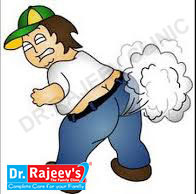Flatulence is Commonly known as farting, passing wind, or having gas. Flatulence is a medical term for releasing gas from the digestive system through the anus. It occurs when gas collects inside the digestive system, and it is a normal process.
Gas collects in two main ways.
- Swallowing air while eating or drinking can cause oxygen and nitrogen to collect in the digestive tract.
- when we digest food, digestive gases such as hydrogen, methane, and carbon dioxide collect. Either method can cause flatulence.
CAUSES OF FLATULENCE
Flatulence is very common. We all accumulate gas in our digestive system.
Swallowing air
It is natural to swallow air throughout the day, normally during eating and drinking. Typically, we will only swallow a small amount of air. If frequently swallow more air, we may find that experience excessive flatulence. It may also cause burping.
Reasons that one may swallow more air than normal include:
- Chewing gum
- Smoking
- Sucking on objects such as pen tops
- Drinking carbonated drinks
- Eating too quickly
SYMPTOMS OF FLATLENCE
- swollen abdomen
- Abdominal pain
- Gas that’s persistent and severe
- Vomiting
- Diarrhea
- Constipation
- Unintentional weight loss
- Heartburn
- Blood in stool
Dietary choices
Dietary choices could lead to excessive flatulence. Some foods that increase gas include:
- Beans
- Cabbage
- Broccoli
- Raisins
- Lentils
- Prunes
- Apples
- Foods high in fructose or sorbitol, such as fruit juices
COMPLICATIONS OF FLATULENCE
If our diet doesnot contain a large amount of carbohydrates or sugars, and we donot swallow excessive air, our excessive flatulence may be due to a medical condition.
Some of these conditions include:
- Constipation
- Gastroenteritis
- ood intolerances, such as lactose intolerance
- Irritable bowel syndrome (IBS)
- Crohn’s disease
- Celiac disease
- Diabetes
- Eating disorders
- Ulcerative colitis
- Dumping syndrome
- Gastroesophageal reflux disease (GERD)
- Autoimmune pancreatitis
- Peptic ulcers
MANAGEMENT OF FLATULENCE
- Diet- If it contains a large amount of carbohydrates that are difficult to digest, try to replace them. carbohydrates that are easier to digest, such as potatoes, rice, and bananas, are good substitutes.
- Diary food-This will help to identify any triggers. After identify some foods that cause excessive flatulence, we can learn to avoid them or to eat less of them.
- Eat less more- Try to eat around five to six small meals a day instead of three larger ones to help your digestive process.
- Chew properly- Avoid doing anything that may increase the amount of air that swallow. This includes making sure that we’re chewing food properly, and avoiding chewing gum or smoking.
- Exercise- Some people find that exercising helps to promote digestion and can prevent flatulence.
PREVENTION OF FLATULENCE
Some foods that are less likely to cause gas include:
- Meat, poultry, and fish
- Eggs
- Vegetables such as lettuce, tomatoes, zucchini, and okra
- Fruits such as cantaloupe, grapes, berries, cherries, avocado, and olives
- Carbohydrates such as gluten-free bread, rice bread, and rice
HOMOEOPATHIC TREATMENT FOR FLATULENCE
ASAFOETIDA : Useful medicine for flatulence with regurgitations of liquids. Explosive belching that smells of garlic and has a rancid taste and forcible belching of gas are also indicative of this medicine.
CARBO VEG : Useful to treat flatulence coupled with sour and putrid belching that occur after eating or drinking.There is belching provides temporary relief.
MAG PHOS : Useful to treat flatulence coupled with a bloated abdomen and a sensation of fullness. There is flatulent colic that forces the patient to bend double, loosen clothing, walk, and constantly pass flatus.
RAPHNUS : Used to treat flatulence with a distended abdomen.Given when flatulence may be retained and not get passed up or down.Very useful for post-operative gas.
ARGENTUM NITRICUM : Useful to treat flatulence that causes distention of the abdomen after eating. There also may be a desire to consume sweets, which worsen the problem.
CHINA : Useful medicine to treat flatulence caused by consuming tea, beer, wine, impure water, fruits or milk. There is flatulence in the stomach.
LYCPODIUM : Useful medicine used to treat flatulence that is noisy and is accompanied by a bloated abdomen. There is feeling of fullness immediately after a light meal. There is constant sense of fermentation in the gut, like yeast working continuously, is present.
ALOES : Useful to treat flatulence with abdominal pains that get better after passing burning, offensive-smelling flatus. The flatus gets accumulated and causes twisting pains in the abdomen.






